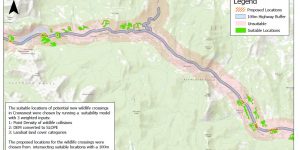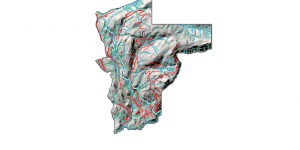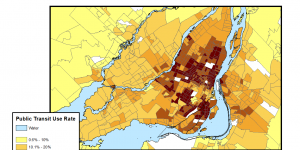Advanced GIS: Alberta Wildlife Crossings
Final project for GEOB 370: Advanced GIS. I produced maps and models which suggested new wildlife crossing locations along the Crowsnest Highway in Alberta, Canada.
Trail Six: Volumes 13 and 14
For two consecutive years, I have contributed to the UBC Department of Geography's undergraduate academic journal. I was one of the editors for Volume 14 and was responsible for designing the layout for the book. For Volume 13, I wrote a case study on Cambridge Analytica's microtargeted advertising operations before they shuttered in 2018. The article can be found on page 24.
UBC Geering Up Engineering Outreach
During my co-op work terms with Geering Up, I raised over $620,000 for the organization through grant applications and sponsorship agreements. On the side, I optimized Geering Up's communications materials, including our staff newsletter and the 2020 sponsorship package. I also helped start a new program at Geering Up, an internship program for Indigenous high school students.
Learning GIS: Environmental Impact Assessment
For this assignment, I had to produce 2 maps of the Garibaldi Resort project area near Squamish, BC to conduct an environmental impact assessment. I applied GIS analysis skills such as proximity analysis, clipping, unions, reclassifcation, area calculation, hillshade production, and multi-field queries to develop my personal skill set and identify areas of ecological concern to the project's developers.
Learning GIS: Professional Development Reflection
In this activity, I was tasked with reviewing all of my accomplish statements and portfolio posts. I had to write a personal statement which describes my experience in Geography 270 and summarizes my academic findings and personal development outcomes.
Final Project: Urban Fabrics & Transit Ridership
In this project, I applied the lessons I learned throughout GEOB 270 to develop 3 maps of public transit use by census tract for Metro Vancouver, Montreal, and Calgary. I executed GIS analytical functions such as joins, reclassification, and field calculation in order to visualize census data. I discussed the results of my visualization in reference to literature on urban fabrics, transit-oriented development, and factors which affect public transit ridership.
Learning GIS: Storm Surge Mapping
In this activity, I worked with spatial and tabular datasets to highlight areas of Metro Vancouver that at risk of flooding during a storm surge. I executed geographic analysis functions such as buffers and overlays, evaluating the data integrity of my maps along the way.
Learning GIS: Quantitative Data Classification & Data Uncertainty
For this course with Dr. Hermansen, I was tasked with classifying housing costs in Metro Vancouver with 4 different methods. In this post, I will discuss how these methods influence map interpretation and how data uncertainty and suppression create "no data" census areas on my maps.
Learning GIS: Cost of Housing
For this course with Dr. Hermansen, I had to develop maps comparing shelter costs and housing affordability between Metro Vancouver and Montreal.
2019 UBC Sustainability Fair
As the project lead for this event, I collaborated with a team of 4 other undergraduates to design and implement the 2019 UBC Sustainability fair which was hosted on February 5th.
Publication - Cambridge Analytica, Microtargeting, and Power
Through UBC Geography's undergraduate academic journal, I published a case study which identifies geopolitical implications of Cambridge Analytica's microtargeting operations which came under public scrutiny in 2018.



